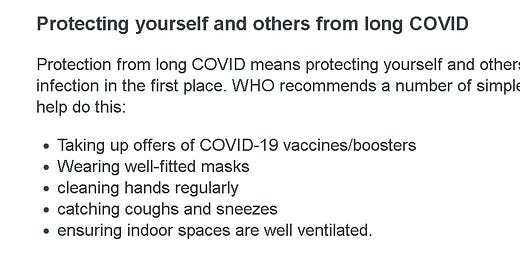Lately I am seeing references to long COVID as a mass disabling event. It’s been described in those terms since midway last year, but the usage is picking up in frequency. A recent report by Canada’s chief science advisor used the term, which has been picked up by insurance industry trade journals. Insurance trade journals are a good bellwether for what is coming up in the media and public consciousness, probably because insurance companies need to predict the future to make their money.
I think that's good framing. The WHO has estimated that at least 17 million people in its European region alone are affected by long COVID symptoms. A recent article in Nature Reviews Microbiology1 uses an estimate of 65 million people globally living with long COVID symptoms.2 That’s based on 10% of all documented COVID cases. Considering that many, possibly most, cases of COVID are never documented, we can pretty much guarantee that 65 million is an underestimate.
65+ million people with fatigue, shortness of breath and cognitive dysfunction. I will go ahead and say that’s going to be a problem. News media has focused on economic impact, but I would like to state for the record that I know a lot of people with long COVID and it’s a horrible thing for a human being to live with. The economic impact is going to be bad. The human impact is going to be worse.
The WHO then follows their solid discussion of COVID data with laughably ineffective and/or impossible follow advice on preventing long COVID. Ugh.3 (It is my personal belief that taking Paxlovid and metformin when infected will reduce the odds of long COVID, but that is a guess on my part. The data is still firming up, and I make plenty of mistakes.)
We’re all talking about COVID now as a manageable respiratory infection and I am - uncomfortable - with this. There’s some magical thinking going on, with our mass disabling event and also our manageable respiratory infection. Alanna does not like it.
Finally, some bonus links:
Eric Topol has an excellent, sobering round-up on brain inflammation after COVID.
This YouTube video about the Bon Appetit Test kitchen hit me right in the gut with its discussion of COVID and collective trauma:
The Rise and Fall of the Bon Appétit Test Kitchen
The video creator, kayla says, made the video to talk about celebrity chefs. But she starts with a discussion of the height of the pandemic - and why no one thinks about it any more. Because it was a massive collective trauma. We can barely remember it, let alone learn lessons.
Is that how you format a journal title? If it’s not, just believe me that it’s a journal title.
The article also has an excellent comprehensive listing of long COVID symptoms.
About 50% of the time, public health officials tell you to wash your hands because we have no idea what else to suggest and washing your hands will at least reduce your risk of diarrhea and the common cold.




Alanna, you just made me watch a whole 16-minute video about Test Kitchen, which I did not care one bit about, but whew, the opening, as you say. W h e w.